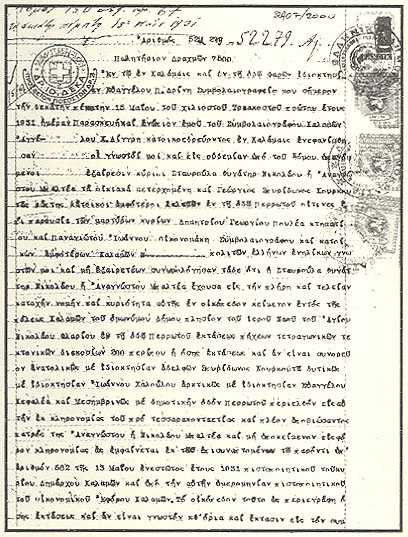 |
|
|
A Brief History of the Balteas Family from Stavropigi of Exo Mani and Messinia, to Varousi in Lakonia |
|
|
By Aris Poulimenakos, genealogist, and Nikos Balteas Foreward by Donald George McPhail, Editor of Mani:Yesterday, Today, Tomorrow Translation and notes by Mary Papoutsy The original article appeared in Greek in the May-June issue (Volume 10) of the magazine Mani: Yesterday, Today, Tomorrow. Posted to HCS with permission of the editor. Continued from Page Five document dated 15 May 1931 (see Fig. 7 below), we read that his daughter, Stavroula, sold "to another contracting party, Georgios Spyridon Kourkoutos, her sister's son. . ." one house plot "coming into it through inheritance more than four decades earlier when her father passed away, Anagnostis or Nikolaos Balteas. . . ." Therefore Nikolaos or Anagnostis Balteas had passed away before 1891. His baptismal [given] name was Nikolaos. "Anagnostis" was the title of a lower office of the clergy. Customarily this title itself substituted completely for the "small" [baptismal or given] names of persons who possessed it. A presiding bishop granted this ecclesiastical office during a special rite.18 reported Dionysios Sigalos in his book, The History of Sparta and the Lakedaimons (see Fig. 8 above and pp 455-456 of Sigalos). 18The exact term used in the original Greek of the article, "cheirothesia," substituted by my English phrase, "special rite," actually signifies the type of ritual used to confer this honor, a "laying on of hands by the hierarch" during a special ecclesiastical service. A fair translation of this single Greek word, conveying its rich connotation, is simply not possible. 19Just as in genealogical research in other areas of the world, including the U.S., some boundaries changed over time. Researchers must research cautiously, always taking into account local history over a large continuum--a continuum stretching over centuries, not decades. Furthermore, a small number of Greek villages underwent name changes, the details of which are not readily available to foreign researchers. In more recent times, since the early 1990s, the Greek government has been downsizing its rural branches and combining the offices of smaller villages; civil records--so important to genealogical research--once kept at local "town halls" are not likely to be found there, but at regional offices. As part of this downsizing, called the "Capodistrian Plan" after the nation's first prefect, some political districts have also been redrawn and in a few cases, entirely new districts have been created. |
|
|
|


